Blockchain application ushered in administrative "broken windows"
The exciting times seem to be coming, and more and more blockchain applications are beginning to emerge.
Yesterday, the Tianjin Port Blockchain Verification Pilot Project went on-line trial operation, and for the first time in the country, the deep integration of blockchain technology and cross-border trade in transactions, finance, logistics, supervision and other aspects, initially established a blockchain cross-border The trade ecosystem will further enhance the level of trade facilitation at Tianjin Port.
It is worth noting that this project is the first time a national ministry has applied blockchain technology to a practical project.
This is the first customs blockchain verification system in China, and it is another application trial operation after the blockchain invoice application field. It is another attempt to improve the efficiency of the blockchain in the administrative field.
- Bitcoin Governance: What is BIP (Bitcoin Improvement Proposal) and how do they work?
- Bitcoin becomes the official currency of Sweden? But only lasted for thirty minutes
- Grab the unicorn of the next wave of cryptocurrency worlds
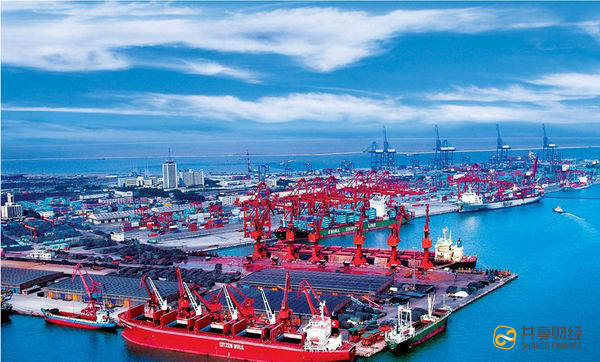
The landing of the administrative field, illustrating the strong vitality of blockchain technology, means the recognition of the blockchain by government agencies.
On March 18 this year, the country's first rail transit blockchain electronic invoice was opened at the Shenzhen Metro Futian Station.
Starting from the first blockchain electronic invoice in Shenzhen in August 2018, in just half a year, the Shenzhen blockchain electronic invoice has covered financial insurance, retailer super, hotel catering, parking services, Internet services, transportation industry six Large area.
It is worth mentioning that on August 10 last year, Shenzhen Guomao Rotary Restaurant opened the first blockchain electronic invoice on the day of the country. Ren Rongfa, deputy director of the State Administration of Taxation, and Ai Xuefeng, deputy mayor of Shenzhen, also visited the scene. witness.
Since the beginning of this year, there has been a marked acceleration in the blockchain landing.
As we all know, one of the most important problems in the past 10 years of delay in the application of blockchain is that the development of technology is not enough to integrate with the real economy.
The advantages of blockchain technology have long been known, namely: decentralization, non-tampering, non-removability, and traceability.
But it is very difficult to decentralize the information of the real economy.
Before 2017, the application of several blockchains in China was only a combination of digital information technology. Most of the world's technical teams are more likely to wait for the technical development of a certain team, and then to study and emulate them, independent research and development capabilities are not yet available.
The blockchain is not equal to the virtual currency. The application that intervenes in the digital currency cannot be understood as a blockchain application. Most of these applications are only the shell application of the blockchain.
Coupled with the instability of technology in the early stages of development and the conservative attitude of governments at all levels, the application of blockchain has become difficult.
Taking China as an example, in the early stage of the development of blockchain, the Chinese government has adopted a conservative attitude towards the blockchain, focusing on supervision and development, supplemented by development.
In 2016, the Chinese government launched a one-year special rectification of Internet finance. In September 2017, the China Internet Finance Association issued the “Tips for preventing the so-called “virtual currency” risks such as Bitcoin”, etc. Prevention has made it difficult to land the blockchain.
Nowadays, whether it is the application of blockchain technology in Beijing Haidian District to reduce the time limit for the convenience of the real estate transfer, or the Tianjin port blockchain verification pilot project on-line trial operation, we have seen that the blockchain application has passed the bottleneck period.
The field of e-government is undoubtedly the most suitable area for blockchains. Statistics show that the application of blockchain will reduce government costs by 30% to 50% and save 50% in operations.
It is reported that from 1999 to the present, from the process of government informatization to the development of digital government affairs, China's e-government construction has long had problems such as “individual politics, fragmentation, and information islands”. The blockchain is able to open up the data deposited by various departments, and truly realize the “one window, one network and one network” to better provide convenience services.
Xiong'an New District is undoubtedly an example in the cities where blockchain technology and government applications are applied.
As early as 2018, Xiong An launched the blockchain housing leasing application platform in the development of e-government. The tree “identity” and finance of the millennium Xiulin project are applying blockchain technology. Subsequently, construction project bidding and personal points are applied. The system and so on are successively branded with blockchain.
We know that China is currently in the era of digital government, and blockchain technology has a wide range of application scenarios in the field of government affairs, such as digital identity, property registration and notarization, court forensics, business registration, and voting.
In September last year, Huixian.com released the first blockchain copyright registration certificate in China. Through the blockchain digital copyright registration and deposit service, users can obtain the protection of the blockchain certificate in 3 minutes. Huang Xiaotao, president of the Guangzhou Copyright Association, said that the release of the first blockchain copyright registration certificate is a useful exploration of blockchain technology in the copyright field, and will actively promote copyright protection, trading, and industrial operation.
On September 18, 2018, the Hangzhou Internet Court announced that the judicial blockchain was officially launched, becoming the first court in the country to apply blockchain technology.
Blockchain technology is promising in terms of government management. In terms of enterprise applications, it can be seen that the current blockchain can be rapidly integrated into actual business operations, mainly large enterprises and financial institutions.
On the one hand, financial institutions are familiar with industry game rules and business operation pain points, and can use the blockchain technology to “prescribe the right medicine”, so that the blockchain technology has the operability and efficiency improvement effect; on the other hand, they also have a large number of scenes and resources to promote The use of blockchain technology has landed and the technical delays at night.
A few days ago, Forbes ranked the top 50 global blockchain list, and most of the listed companies were large enterprises. Among them, China's Ant Financial, Foxconn, HTC and other companies were selected. This blockchain ranking records the rise of the first so-called "enterprise" blockchain, meaning that the era of blockchains has been officially over.
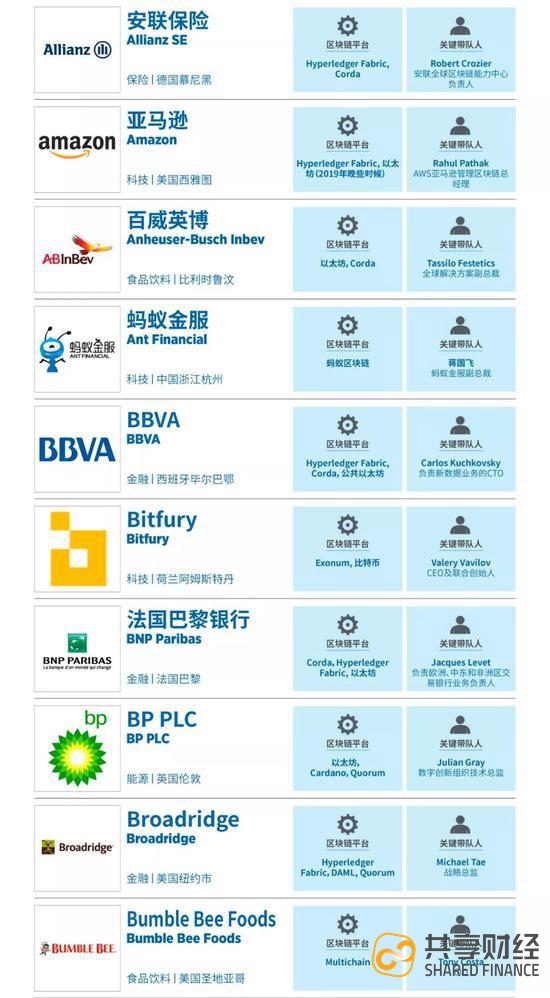
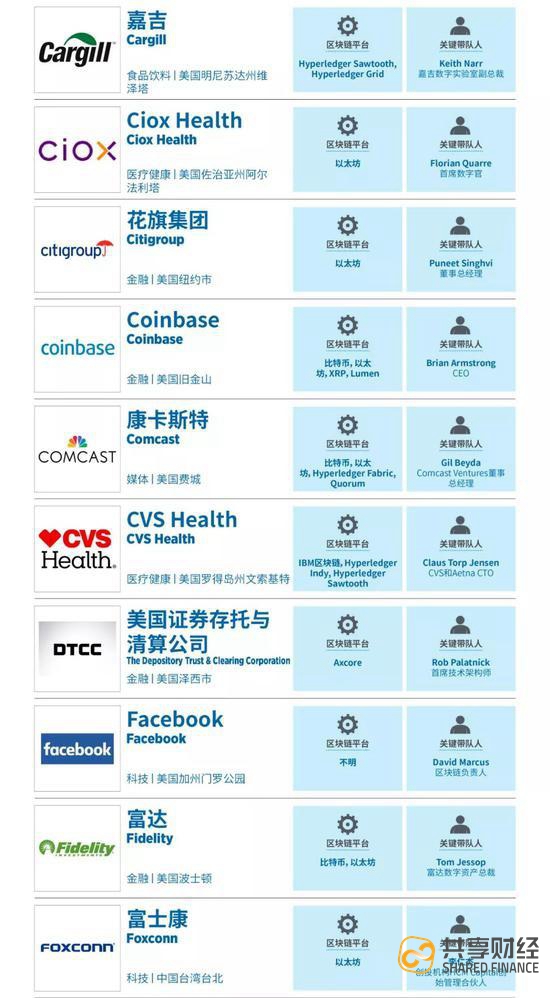
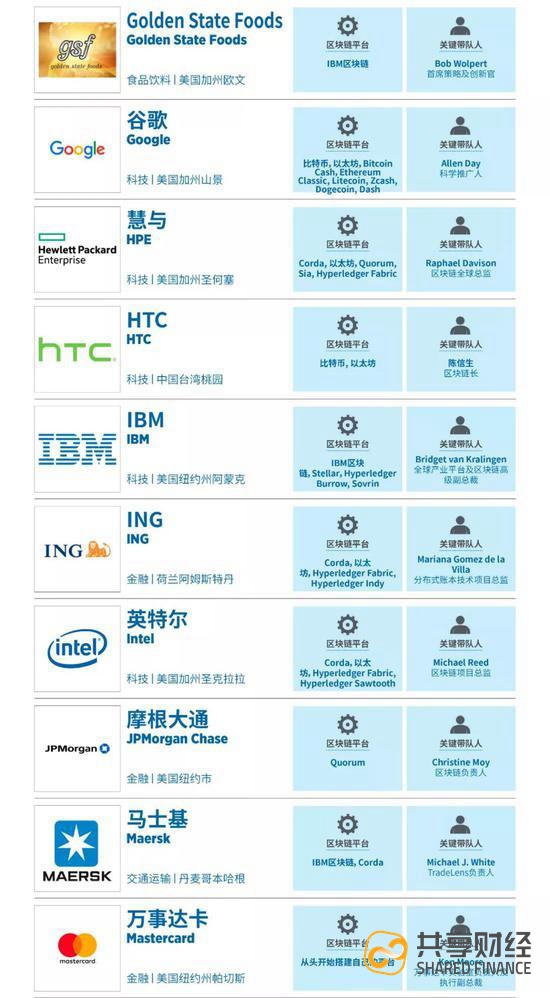
Globally, the application of blockchain in the real economy has progressed well.
At the first BIBI Asia Pacific meeting on April 17, shared financial reporters learned that BMW is currently studying the use of blockchain to establish the interconnection between cars and cars, machines and machines. 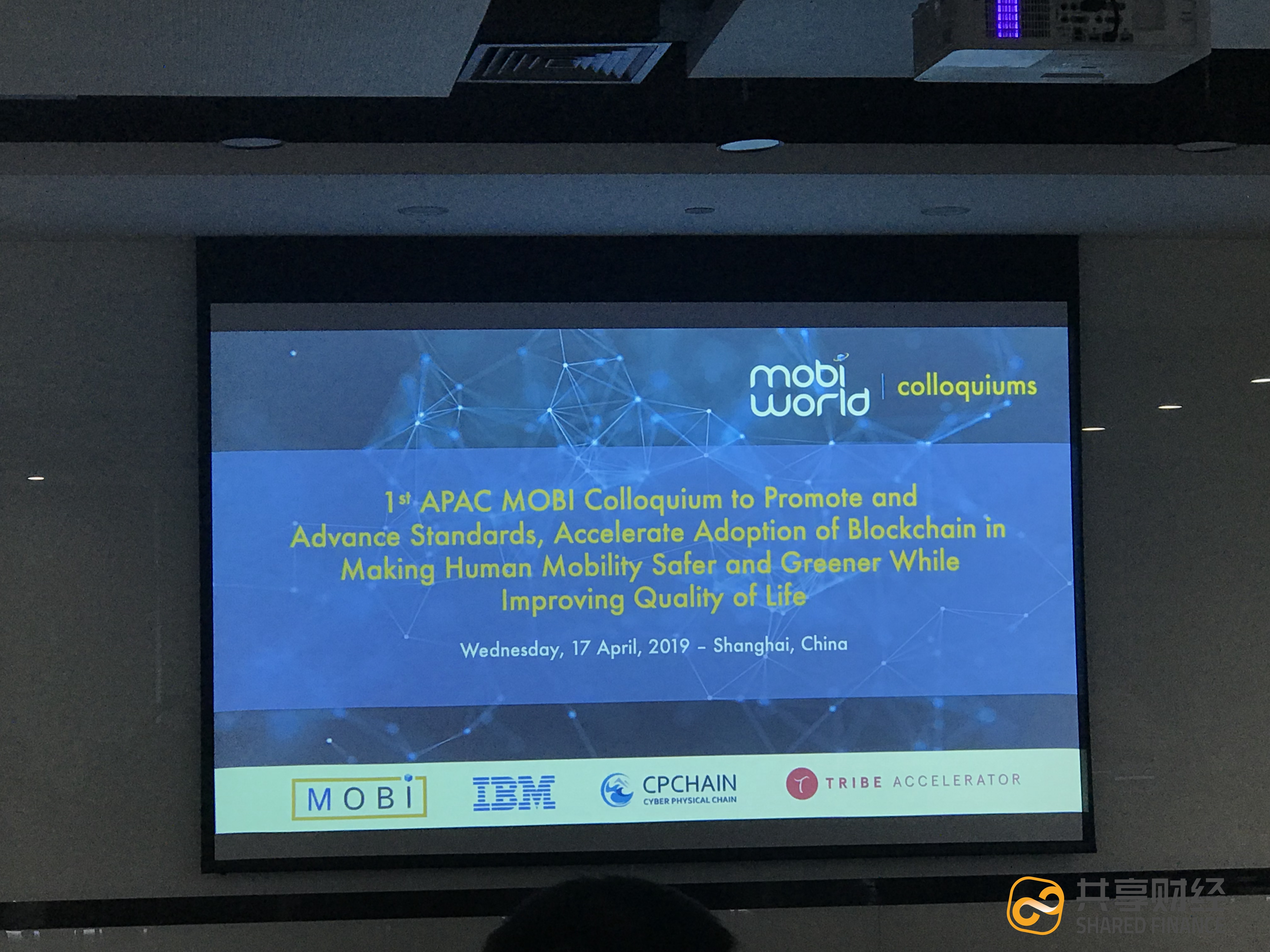
On April 16th, the shared financial reporter was informed that Porsche will cooperate with the blockchain professional organization Quantoz in the Netherlands to record and collect parking fees using blockchain technology. Such technology will automate the smile transaction and reduce the driver's payment time. The car park brings cashless transactions.
For the blockchain application of the real economy, local governments have also issued and implemented a series of safeguard programs.
In short, the technology is more stable, and the relevant laws and regulatory systems are only perfected. The application of the blockchain will be truly universal. It is not an empty talk to improve the life of science and technology in the blockchain.
As Dr. Long Chengnian, founder and CEO of CPChain, said at the first MOBI Asia Pacific meeting, “The application of blockchain technology in all walks of life requires the cooperation of government, enterprises and all parties.”
Author: Sharing Finance Ma Ming Editor: Alian
(This article is the sharing of financial originals, please indicate the source and author)
We will continue to update Blocking; if you have any questions or suggestions, please contact us!
Was this article helpful?
93 out of 132 found this helpful
Related articles
- Chainge Technology Open Day | 4 hours to see the technical direction of 2019
- Forbes starting blockchain top 50 companies list
- Video|"8 Questions" Nebula Chain Xu Yiji: I want to be a "master" instead of a "big brother"
- Bitcoin national bonds! Three countries expressed their interest in issuing sovereign bitcoin bonds to raise funds
- Follow-up of the Hodlonaut incident: CSW responded for the first time and hopes to prove itself through litigation
- Microsoft, Enterprise Ethereum Alliance (EEA): Launching a "Certified Classification" project for enterprises
- Will people who speculate on stocks go to bitcoin?






